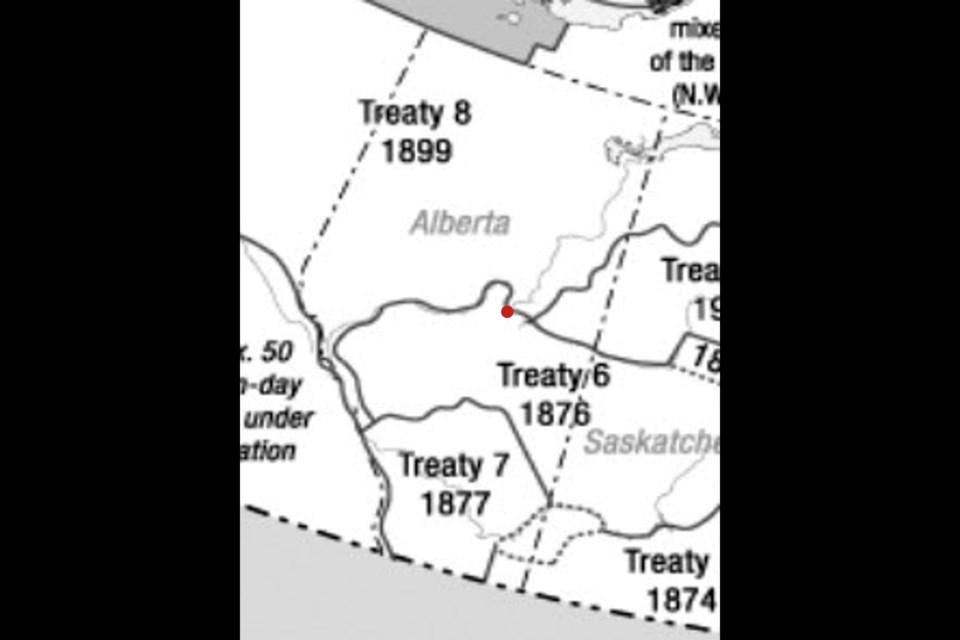ATHABASCA – Athabasca town council certainly knows a lot more about Indigenous land acknowledgements now than it did the week before but will continue researching how it would be implemented and what the exact details would be, if the town was to explore adding such a policy to its books.
Tentatively, three councillors and the mayor said they would likely support a motion to adopt a land acknowledgement of Treaty 6 and Treaty 8 lands as part of the municipality’s regular business, at their Nov. 2 meeting, but a motion by Coun. Jon LeMessurier was accepted to allow for more information to be gathered on the subject.
More information came in the form of a delegation from Alma Swan at the Nov. 16 meeting. A member of Bigstone Cree Nation and a generational survivor of residential schools — her mother attended one of the facilities for 11 years — Swan was invited by LeMessurier to speak to council to lay out the reasons why a land acknowledgement was an important step in reconciliation.
Land acknowledgements “were inspired by the 94 calls to action from the Truth and Reconciliation Commission. It’s one of the calls to action and the reason for it is it’s one of the first steps toward reconciliation and honouring the original occupants of the land,” Swan said, adding it is important to recognize Treaty 8 as well due to the longstanding relationship developed between the people of the two treaty areas over the last 100 years.
It also recognizes and shows respect for Indigenous people and their beliefs and recognizes them as the original inhabitants and stewards of the land, she said. It’s also important to know exactly which nations those inhabitants are a part of, to recognize unceded territories not recognized under any treaty, and to consult with an elder to produce a proper and respectful acknowledgement — a process that follows its own strict protocols.
Regarding questions from councillors as to whether Indigenous people are in favour of such practices, Swan pointed out “it was Indigenous people that put together the calls for action, so they've asked for this … It has to be done because you think it's the right thing to do as opposed to doing it to help fulfil a political agenda.”
Based on conversations he’s had with other Indigenous people, Coun. Dave Pacholok asked how acknowledging treaty land makes Indigenous people feel any better about the situation.
“I've been to places where they've said, ‘You've taken over our land and this is ours, basically to the point of we want it back, so I'm wondering how acknowledging this is actually helping us to get closer or helping you to feel better about the situation?” asked Pacholok.
Swan responded it is part of recognizing the truth that Indigenous people are the original inhabitants of the land but have prematurely settled court cases with the federal government.
“In order for it to be settled, the Indigenous peoples of the area have agreed upon what has been given back to them. I mean, Indigenous people will never ever get all the land back that was essentially theirs; there's never going to be a perfect answer, or a perfect solution, but we have to work toward that reconciliation, and in order to move toward reconciliation, then you have to acknowledge the truth. Who are the original inhabitants? What happened before today?”
Coun. Ida Edwards asked for some help in understanding why, if treaties were signed, there are still land disputes.
“They were signing treaties that the Indigenous people thought were being signed in good faith, but most of the time they didn't even speak English, so they trusted, and that's why there's so many debates and so many court cases now — because they weren't signed in good faith,” said Swan.
A motion to defer further discussion to the next council meeting passed unanimously.
“I think we have a lot of work to do. Even coming from a Western perspective in how we approach this isn't the right starting point,” said Coun. Sara Graling. “There’s a lot we need to do I think, before setting up our next steps.”
“Everything starts from somewhere,” said Swan.



